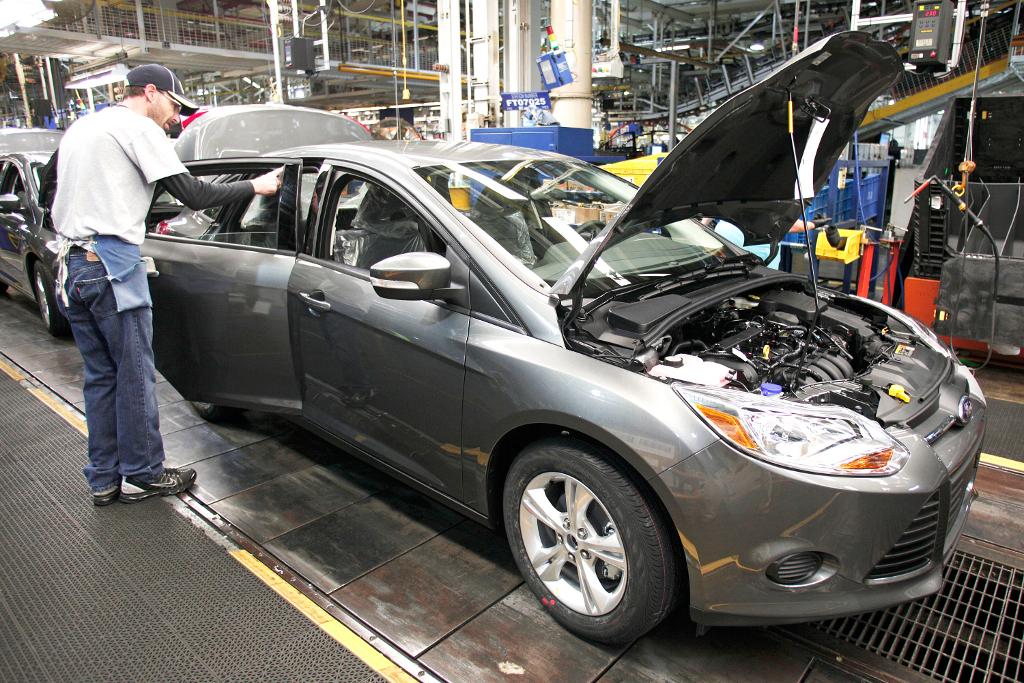US manufacturing stalls given lack of applicants
A Ford worker assembles a 2013 Ford Focus gasoline-powered, vehicle at the Michigan Assembly Plant November 8, 2012 in Wayne, Michigan.
Bill Black is, to use his blunt assessment, "pissed off." For 5 years, the executive vice president of Aphelion Precision Technologies has been unable to fill 7 to10 job openings at his family owned business in suburban Chicago. The company which makes components for aerospace and electronics firms has 46 employees.
"I sometimes wake up in the morning and I'm thinking, maybe people just don't want to go to work," said Black. "Maybe it's easier to stay at home and not work. I don't know."
Black's rhetorical question is one that many manufacturers are asking themselves. As the economy recovers and the country's manufacturing base ramps up production it is struggling to fill jobs. Sometimes it's because the applicants lack the skills needed to run complex machinery, but often it's because there are simply too few or no applicants.
"Seems like with unemployment as high as it has been it shouldn't be hard, but we have situations where people aren't interested in working or they don't fit our needs," said Doug Conrad, owner of Metal Technologies Inc. In Bloomfield, Indiana.
At Metal Technologies in Bloomfield, Indiana these are boom times. In the last three years business has doubled for the auto parts supplier — which sells engine casing compartments, oil pans and other components to larger, tier one suppliers in the auto industry. As auto sales have surged, so has demand for Metal Technologies products. (Read More: Earn $300,000? Obama Might Not Tax You More)
Still, the company with 128 employees has 5 to 7 job openings it can't fill. "We get really frustrated when we have a job and we can't get anyone to work it," said Randy Lovelace a production manager at Metal Technologies.
Even more incredible, Lovelace said some applicants have told him they'd rather stay unemployed instead of taking a job starting at $10.00 to $12.00 an hour. (Read More: US Jobs Market 7 Percent Better Than Last Year)
"We have actually had people who we have hired for jobs. We have had them sit in front of us, set to start the next day, and then they call in and say, "I'm not gonna take that job, they just extended unemployment benefits,'" said a frustrated Lovelace. "At that point we've called the state of Indiana and turned 'em in. But yeah, we've had people say, 'I'm not taking that job.'"
At Aphelion Precision Technologies outside Chicago, Bill Black has jobs starting at $12.00 an hour he's been unable to fill for years.
"I ran an ad and I said, 'No experience necessary, apprentices willing to hire, willing to train.' No one showed up. Not a single applicant," said Black, whose parents founded Aphelion in 1981.
With the unemployment rate still around 8 percent and with the number of manufacturing job openings rising, you'd think finding applicants would be easy. Black says nothing could be further from the truth. (Read More: Economy Creates 146,000 Jobs, Rate Slides to 7.7%)
"In the blink of an eye, I'd hire [10 to 15 people] right now. That's the reality," said Black.
With more American manufacturers moving their plants to three shifts, the lack of applicants and inability to fill jobs is weighing on companies. At Metal Technologies there are work stations that sit empty because the company has openings.
"Even though you pay shift premiums and things like that to entice them to work those off-shifts, it's double hard to get them to work that," explained Conrad. (Read More: Fiscal Cliff, Complete Coverage)
When Aphelion could not staff an overnight shift it joined a growing list of companies turning to lights out manufacturing. It now programs a machine to build parts overnight when no one is on the shop floor.
"I'm still running (want) ads," said Black. "Unfortunately, not many are showing up, but I'm still looking to hire."
More from our partner CNBC:
CNBC: Consumer sentiment plunges in December
CNBC: Boehner Obama walking to edge of "cliff"
CNBC: Triple dip recession looms in UK
CNBC: Hedge against the fiscal cliff with the Peso
CNBC: Asian growth slowing
The article you just read is free because dedicated readers and listeners like you chose to support our nonprofit newsroom. Our team works tirelessly to ensure you hear the latest in international, human-centered reporting every weekday. But our work would not be possible without you. We need your help.
Make a gift today to help us reach our $25,000 goal and keep The World going strong. Every gift will get us one step closer.
